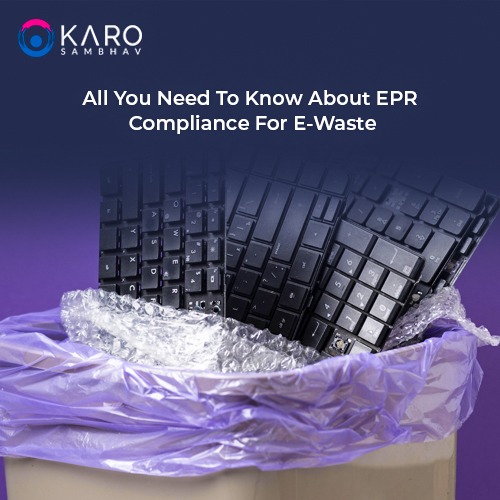Plastic Waste Management And Initiatives At Karo Sambhav
India generates over 3.4 million tonnes of plastic every year. Yes, that’s quite a number. Unfortunately, plastics are mostly chlorinated and are rich in chemical compounds. Obviously, plastics are detrimental to the environment. The shrinking aquatic life, the rising underground cavities, and the depleting environmental conditions epitomise the disastrous impacts of plastic. It might surprise you to learn that 90% of the world’s seabirds and turtles are spotted with plastic trash and micro-particles stuck in their guts. Besides, plastics are choking the survival of whales.
Are you of the idea that switching to the so-called ‘biodegradable’ plastics is good for the environment? Well, you are certainly mistaken. Sometimes, plastics labelled as biodegradable take more than 100 years to dissolve naturally. What remains, though, are garbage patches swirling in the middle of oceans and water bodies. Can you miss the landfills? Have you heard of Ghazipur? It is the largest plastic dumpsite in Delhi. In fact, why just Ghazipur? There are more than 3100 landfill sites across the country, and the number is on the rise.
Hence, plastic waste management is critical in the present time. Almost every day, there’s someone talking about abandoning plastic use for good or exploring more ways to recycle plastic. Is it effective, though? Sadly, not! A more strategic approach to tackle the growing volumes of plastic waste is much needed. Hence, the introduction of EPR plastic waste.
What is EPR for plastic waste?
EPR or Extended Producer Responsibility aims to reduce plastic waste significantly. Wondering how? Let’s explain:
Simply put, EPR solutions are lawful regulations that obligate industries, manufacturers, and brand owners to be financially and physically responsible for treating and disposing of post-consumer plastic products. If you are not aware, businesses contribute largely to the increasing plastic debris. From packaging to products, plastic is at the core of most venture operations. EPR plastic compels all PIBOs (Producers, importers, and business owners) to collect and channelise plastic waste and repurpose the products for further use.
Little do you know that EPR India is mandatory for manufacturers and entrepreneurs. First implemented under Plastic Waste Management Rules, 2016, the regulations coerce producers, importers, and brand owners to process end-of-life plastic via recycling. Reusing trashed plastic is unquestionably a great way to upkeep the value of plastic in the production and consumption cycle. Also, this is exactly what circular economy aspires to achieve – minimise waste and close the loop for products and materials.
What are the perks of EPR?
EPR awareness around plastic waste disposal is certainly not unheard of. However, do you know the real-time benefits of EPR in plastic waste? Let’s take a quick look:
- The regulations compel producers to rethink product packaging designs and solutions
- Increase in the recyclability of plastic products
- Resource recovery
- Financial incentives.
It is no secret that the more we recycle and reuse plastic, the fewer garbage winds up in landfills. Besides, creating plastics requires an array of natural materials like cellulose, natural gas, salt, coal, crude oil, and more. Do you think any of these raw materials are infinite? Certainly not! Recycling plastics ensures that the dependency on mining natural materials lessens with time. This is definitely an economic boon. Moreover, the conservation of natural resources is much required for sustainability and environmental betterment.
How is Karo Sambhav working towards reducing plastic waste?
Karo Sambhav is a leading Producer Responsibility Organisation in India. The PRO implements the concept of circular economy and robust tech-enabled frameworks to tackle the plastic waste crisis. Simply put, Karo Sambhav collaborates with the leading FMCG brands and creates alliances with government bodies to make recycling plastics a way of life. From setting up a state-of-the-art plastic collection centre and designing EPR solutions for entrepreneurs to hosting awareness programmes and helping brand owners stay abreast of EPR compliances, Karo Sambhav is dedicated to making efforts at the grassroots level for a more sustainable and plastic-free environment.
- Creating a robust plastic waste management system for Pan India
- Discovering innovative ways to refurbish post-consumer plastic waste
- Strengthen the awareness about plastic waste in various sectors of the society
- Devising benchmarks for the dismantling and enhanced recycling of plastic waste.
So far, India is still working to leverage responsible plastic waste recycling. The existing informal systems, the lack of EPR awareness, and the absence of infrastructure make plastic waste management a little more difficult than anticipated. Karo Sambhav envisions reducing harmful plastic debris in time.
Source : https://www.karosambhav.com/blogs/plastic-waste-management-and-initiatives-at-karo-sambhav



Comments
Post a Comment